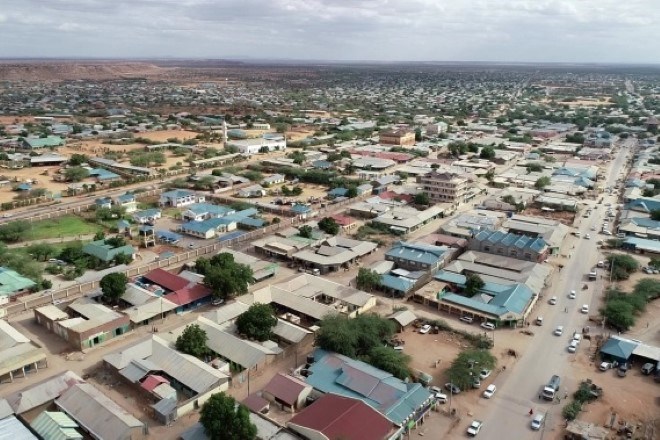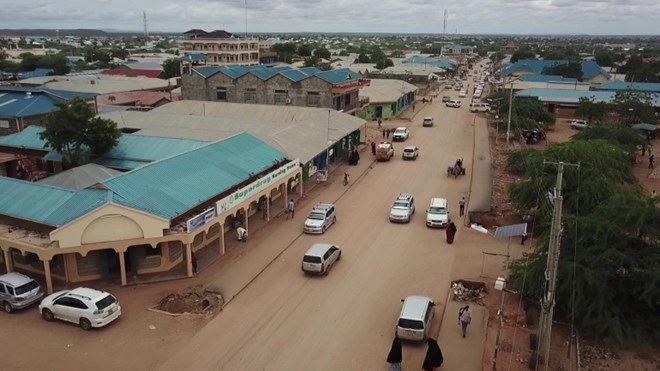
Thursday July 22, 2021
The rash of kidnappings continues a decade after Kenya joined the fight against the armed group in Somalia.

The town of Garissa in Northern Kenya is in one of the counties that has been subjected to abductions by al-Shabab group [Sadam Hussein/Al Jazeera]
Garissa, Kenya – Amina* sits close to the edge of her modest home in Garissa, a county in northern Kenya bordering Somalia. Her 15-year-old daughter is standing opposite her, reading a newspaper lying on the ground.
“Go inside and start washing the house,” Amina, wearing a navy blue hijab, instructs her daughter. “Make sure you clean all the rooms and arrange the furniture as discussed before guests arrive.”
For the last two years, the mother of seven has been frequently welcoming extended family members who visit her to express their sympathy following the abduction of her husband, Abdi*, by al-Shabab, an al-Qaeda-linked armed group based in neighbouring Somalia. On a quiet October night in 2019, four armed men who identified themselves as members of the group entered their house, ordered Abdi to step out, tied his hands and took off.
“I tried to scream and call for help but they pointed a gun at me. They instructed me to remain silent or I’ll lose my life,” said Amina, 49, who has been married to Abdi for 27 years. “I have not had a good night’s sleep since then.”
Kidnappings still rampant
The case of Abdi is among many other abductions that have been reported in villages and towns across the Kenya-Somalia border in recent years. According to media reports in April 2020, at least 11 kidnappings of locals and non-locals took place in Mandera over the previous year.
It was an escalating number of kidnappings, targeting aid workers and tourists in Kenya’s north and coastal regions, that triggered Kenya’s decision in 2011 to join an African Union mission in Somalia to fight al-Shabab in the areas it controlled and create a buffer zone to secure its borders.
A decade later, however, these cases still exist and al-Shabab maintains that they will continue causing havoc, including carrying out deadly attacks, until Kenya withdraws its troops from Somalia.
One of the most high-profile kidnappings took place in early 2019, when two Cuban doctors deployed to work in Mandera were abducted by al-Shabab. The two medics were part of a team of 100 doctors sent from Cuba to work in Kenya after an agreement between the two countries.
Tabitha Mwangi, a security consultant based in Kenya’s capital, Nairobi, said kidnappings benefit al-Shabab in not only gaining media attention to increase prominence but also in acquiring trained professionals who provide essential services in poor communities.
“Groups that use terrorism as a strategy crave drama – heightened suspense, indiscriminate fear and media coverage, which hostage-taking provide,” said Mwangi. “Furthermore, kidnapping for ransom is a common tactic deployed by terrorists to finance their operations and delegitimise governments by forcing them to negotiate with these groups due to media coverage and pressure from the families of victims of kidnapping.”
However, al-Shabab rarely demands ransom for the abducted Kenyans. Families like that of Amina’s have not received any demands from the group, making it impossible for them to know the fate of their loved ones.

Mandera county is riddled with acute poverty, underdevelopment and lack of security [Sadam Hussein/Al Jazeera]
“Al-Shabab kidnaps [trained] personnel to use their expertise such as medical knowledge to treat their militants and communities in the areas that they control,” said Mwangi.
Residents in Kenya’s northern counties have long complained of marginalisation and neglect following independence in 1963, resulting in acute poverty and underdevelopment. The rash of kidnappings has only made matters worse, exacerbating insecurity and economic woes.
“Al-Shabab’s abductions have robbed off normalcy across the region,” said Sadam Hussein, a Mandera-based journalist who has extensively covered developments there.
“In Mandera county, for instance, many businesses are closed hence prices of basic good have skyrocketed. Schools aren’t fully operating since teachers are scarce. People who operate essential services have vacated therefore contributing to the decline of development in an area that has experienced years of marginalisation,” added Hussein.
Back in Garissa, Amina’s children are busy completing the house chores she had instructed them to do.
Since the kidnapping of her husband, she said she has not received any communication from the government after she reported the incident. Nor she has had any contact with the kidnappers, adding to her confusion.
“I live in a very complicated situation where I don’t know if my husband is dead or alive,” Amina said. “I just want to get closure and hope that he is alive and that he will join us soon. I cannot bear the news of his death.”
By the time of publication, government officials in the security sector had not responded to Al Jazeera’s request for comment. In 2019, Kenya’s Inspector General of Police Hilary Mutyambai visited Mandera county and affirmed that “the work of the police ends at the border” – meaning the government cannot account for the fate of kidnapping victims taken to Somalia.
*Name changed to protect their identity